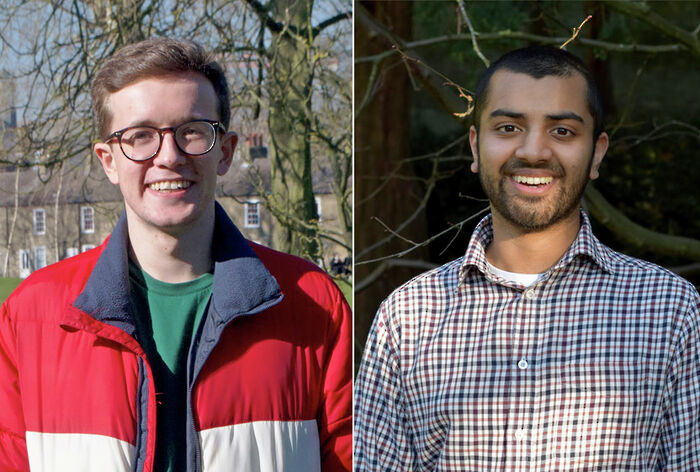
The student’s guide to the CUSU and GU elections
With campaigning for CUSU and GU elections opening today, here’s everything you need to know about the elections

It’s that time of year again – as campaigning for the CUSU and Graduate Union (GU) elections starts, Cambridge braces itself for a wave of political activity, in a flurry of flyers, manifestos and Facebook cover photo updates.
Campaigning began at 9am this morning for the 19 candidates seeking election to nine different positions, including President of both the student unions, CUSU and the GU, and other sabbatical roles.
Which candidates will come out on top? That’s anyone’s guess. But for now, here’s a CUSU/GU elections guide to catch you up on who’s running for what.
Who’s running?
CUSU President
- Edward Parker Humphreys
- Shadab Ahmed
GU President
- Alessandro Ceccarelli
- Devarchan Banerjee
- Jack Chadwick
CUSU Access & Funding Officer
- Ashley Woodvine
- Lily-Rose Sharry
CUSU Disabled Students’ Officer
- Beth Walters
- Jess O’Brien
CUSU Education Officer
- Ali Hyde
- Howard Chae
CUSU/GU Welfare & Rights Officer
- Cici Carey-Stuart
- Stella Swain
CUSU Women’s Officer
- Finley Kidd
- Kate Litman
CUSU Ethical Affairs Officer
- Alice Gilderdale
- Jake Simms
University Councillor
- Poppy Cockburn
- Tamzin Byrne
What are the elections for?
The Lent Term elections are contested between those seeking election sabbatical officer positions on CUSU and the GU for the next academic year – as well as to elect a student representative for the University Council and two part-time Ethical Affairs Officers.
Campaigning got underway earlier this morning with every role being contested by more than one candidate. Those who are successfully elected to the salaried sabbatical roles will take them up in July and take a year out either in the middle or at the end of their course to fulfill their position.
What’s the timeline for the elections?
Following the closing of nominations on Tuesday of this week, campaigning began this morning at 9am. Hustings will be tomorrow, Friday 1st March, at 6pm. Voting will open on Tuesday 5th March at 9am, and will close on Friday of the same week at 5pm. Results will be officially announced at 10 am on Monday 11th March.
How does voting work?
Any member of CUSU can vote for most of the positions, except for GU President which can only be voted for by members of the GU. Additionally, only self-defining disabled or female students can vote for the positions of Disabled Students’ and Women’s Officer respectively.
The elections use a Single Transferable Vote (STV) system, which enables voters to rank candidates in preference order. Students can choose to rank as many candidates as they wish, or can vote for just one.
There is a minimum quota of votes, calculated each year, that candidates must reach in order to be elected. Once a candidate crosses this quota, surplus votes are passed on to a voter’s second preference candidate. If no candidate reaches the set quota then the candidate with the fewest first preference votes is eliminated and the second preference votes are distributed between the remaining candidates. This is repeated until a candidate has enough votes in order to be elected to the role.
What are hustings?
Election Hustings, which will take place on Friday evening, are open to all students. This is an opportunity for candidates to debate with each other on matters of policy in order to try and win more votes from the student body.
What are the crucial rules?
Candidates seeking election must follow CUSU/GU election rules in order to avoid disqualification. Full time Sabbatical officers are granted a budget of £100 each to spend on their campaigns, with those bidding for part-time roles being granted a smaller budget of £70. Students may also use materials which they already own, but must declare them to the Elections Committee, who in turn deduct a suitable cost from the candidate’s campaign budget.
Students often use flyers and posters to spread their campaign, but fly-posting and graffiti are strictly forbidden by the election rules. Hate speech and any action which may be deemed discriminatory is banned, as is candidates making references to rivals’ personal attributes.
Candidates may not announce their candidacy before the campaigning period starts. According to CUSU’s website, one candidate has already been warned this year due to a contravention of this rule, but following the material’s removal, no further action has been taken.
In terms of endorsements, candidates may not seek endorsement from anyone who is not a member of CUSU or the GU. University clubs and societies may endorse a candidate but only if they democratically vote to do so, and evidence of this must be submitted to the Election Committee. However, JCRs and MCRs, autonomous bodies and CUSU/GU staff may not endorse candidates.
Slates, or candidates supporting one another, are also forbidden. This means that candidates may not endorse or support each other and cannot share resources between themselves.
There were particular issues with election rules during last years GU elections, which ended in the delayed announcement of the winner. This followed candidate Joe Cotton being disqualified for contravening the rule that “no candidate...may approach within three metres of the polling station except when they themselves are voting”.
Correction, on Friday 28th February at 10.30: This article was amended to remove a candidate who had withdrawn before the publishing of the article.

All the election news, in one place
Comprehensive news and analysis on the CUSU/GU elections, collected.
Visit Varsity’s Elections 2019 hub.
 News / Judge Business School advisor resigns over Epstein and Andrew links18 February 2026
News / Judge Business School advisor resigns over Epstein and Andrew links18 February 2026 News / Gov grants £36m to Cambridge supercomputer17 February 2026
News / Gov grants £36m to Cambridge supercomputer17 February 2026 News / Union speakers condemn ‘hateful’ Katie Hopkins speech14 February 2026
News / Union speakers condemn ‘hateful’ Katie Hopkins speech14 February 2026 News / CUCA members attend Reform rally in London20 February 2026
News / CUCA members attend Reform rally in London20 February 2026 News / Right-wing billionaire Peter Thiel gives ‘antichrist’ lecture in Cambridge6 February 2026
News / Right-wing billionaire Peter Thiel gives ‘antichrist’ lecture in Cambridge6 February 2026










